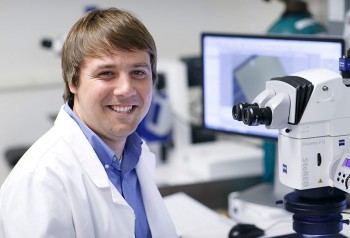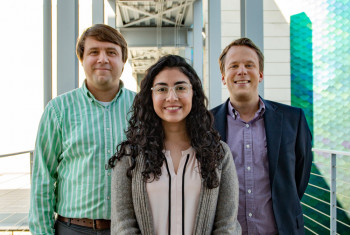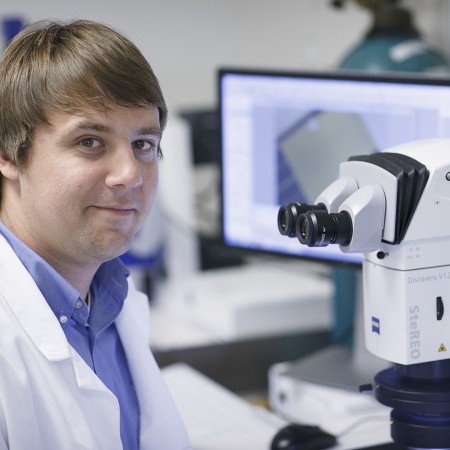 Dr. Taylor Ware
Dr. Taylor Ware, assistant professor of
bioengineering at The University of Texas at Dallas, has received a
Faculty Early Career Development (CAREER) Awardfrom the National Science Foundation.
The highly selective grant supports early career researchers who exemplify the role of teacher-scholar and offers an opportunity for junior faculty to jump-start independent research.
Ware’s research project, titled “Designing Microscale, Shape-Morphing Liquid Crystal Elastomers as Tissue Adhesives,” will receive nearly $500,000 over the next five years.

Combining the powers of the living and the inanimate, an interdisciplinary team from The University of Texas at Dallas has embedded genetically modified yeast into a synthetic gel to create a novel, shape-changing material designed to grow under specific biochemical or physical conditions.
“This is definitely a case where the product is more than the sum of its parts,” said
Taylor Ware MS’11, PhD’13, assistant professor of
bioengineering in the
Erik Jonsson School of Engineering and Computer Science and corresponding author of a
paper published in January in
Science Advances, the
American Association for the Advancement of Science’s open-access journal.
The idea to use the reproductive growth of cells to drive shape change within an inanimate container began with an old, reliable standby: baker’s yeast, or
Saccharomyces cerevisiae.
 Dr. Taylor Ware, assistant professor of bioengineering at The University of Texas at Dallas, has received a Faculty Early Career Development (CAREER) Awardfrom the National Science Foundation.
Dr. Taylor Ware, assistant professor of bioengineering at The University of Texas at Dallas, has received a Faculty Early Career Development (CAREER) Awardfrom the National Science Foundation.
 Combining the powers of the living and the inanimate, an interdisciplinary team from The University of Texas at Dallas has embedded genetically modified yeast into a synthetic gel to create a novel, shape-changing material designed to grow under specific biochemical or physical conditions.
Combining the powers of the living and the inanimate, an interdisciplinary team from The University of Texas at Dallas has embedded genetically modified yeast into a synthetic gel to create a novel, shape-changing material designed to grow under specific biochemical or physical conditions.